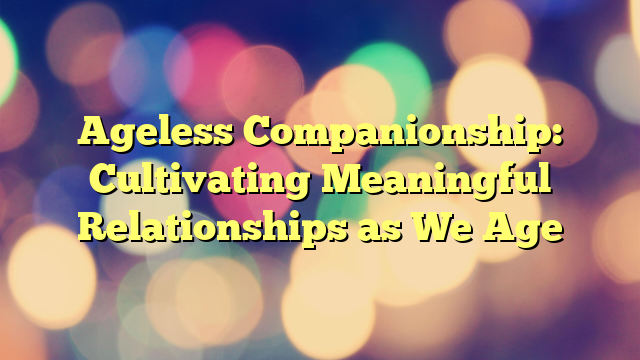Ageless Companionship: Cultivating Meaningful Relationships as We Age

As we age, our social connections and relationships become even more vital to our overall well-being. Cultivating meaningful relationships can contribute to our happiness, mental health, and overall quality of life. In this article, we will explore the importance of ageless companionship and discuss strategies for fostering and maintaining meaningful relationships as we age.
The Importance of Ageless Companionship
Ageless companionship plays a significant role in promoting our emotional well-being. Meaningful relationships provide us with emotional support and companionship, helping combat feelings of loneliness and isolation commonly experienced in older age. Having someone to confide in, share experiences with, and offer a listening ear can greatly improve our mental health and overall sense of happiness.
Furthermore, engaging in social interactions stimulates our brain, enhancing cognitive function. Research has shown that individuals who maintain strong social connections are at a lower risk of cognitive decline and mental health issues such as dementia. Social engagement keeps our minds active, challenges us intellectually, and helps us stay mentally sharp as we age.
In addition to the mental benefits, ageless companionship also has numerous physical health benefits. Studies have consistently shown that individuals with strong social connections have better physical health outcomes. These benefits include lower blood pressure, reduced risk of cardiovascular diseases, and increased longevity. Social interaction can encourage healthier lifestyle choices, such as participating in physical activities together or motivating each other to prioritize self-care.
Cultivating meaningful relationships also provides a sense of purpose and belonging. As we age, it is common to experience a shift in roles and responsibilities, which can sometimes lead to a loss of identity or a feeling of being disconnected from the world. However, by nurturing relationships, we can find a renewed sense of purpose and fulfillment. Whether it’s being a supportive grandparent, a trusted friend, or an active member of a community, having meaningful connections gives us a reason to look forward to each day and live a more purposeful life.
Strategies for Cultivating Meaningful Relationships
1. Stay Connected with Family and Friends
- Regularly reach out to family members, friends, and loved ones through phone calls, video chats, or in-person visits. Actively make an effort to maintain contact and show genuine interest in their lives.
- Plan regular family gatherings or reunions to strengthen bonds and create lasting memories. These occasions provide an opportunity to reconnect, share stories, and create new experiences together.
- Take advantage of technology to stay connected with long-distance friends and family members through social media platforms or email. Share updates, photos, and engage in conversations to maintain a sense of closeness despite physical distance.
2. Engage in Community Activities
- Join local community centers or senior organizations that offer various activities and programs aimed at fostering social connections. These centers often provide opportunities to meet like-minded individuals and form new friendships.
- Participate in group activities such as book clubs, hobby groups, or fitness classes to meet new people with similar interests and build meaningful connections. These shared activities provide a common ground for bonding and establishing deeper relationships.
- Volunteer for community service projects or organizations to not only help others but also create opportunities for social interactions. Engaging in meaningful work together with others fosters a sense of belonging and creates a shared purpose.
3. Embrace Technology
- Embrace technology and learn to use social media platforms, video calling apps, or online forums to connect with like-minded individuals and form virtual communities. These platforms provide a convenient way to interact and share experiences with others who may have similar interests or backgrounds.
- Join online support groups or discussion boards related to topics of interest, such as hobbies, health conditions, or personal development, to interact with others who share similar experiences. These online communities offer a safe space for individuals to connect, support one another, and exchange valuable insights and advice.
4. Attend Senior Centers or Retirement Communities
- Consider joining senior centers or retirement communities that provide a supportive environment for socializing and engaging in various activities. These communities often offer a range of amenities and organized events, such as group outings, game nights, or educational seminars, that foster social connections among residents.
- By residing in a retirement community, individuals have the opportunity to interact with peers who are at a similar stage in life, facilitating the formation of new friendships and companionships. These communities provide a sense of belonging and create a supportive network for individuals to rely on.
5. Take Up New Hobbies or Classes
- Pursue new hobbies or interests that allow you to meet people and engage in shared activities. Whether it’s painting, cooking, dancing, or learning a musical instrument, exploring new passions opens doors to connect with others who share similar interests.
- Enroll in classes or workshops that align with your interests. These settings provide a structured environment for learning and socializing, creating opportunities for meaningful connections to flourish.
6. Foster Intergenerational Relationships
- Seek opportunities to interact with younger generations, such as volunteering at schools or mentoring programs. By sharing your wisdom and life experiences, you can make a positive impact on the lives of younger individuals while also fostering meaningful connections.
- Engage in activities or programs that promote intergenerational connections, such as community gardening projects, intergenerational sports events, or storytelling sessions. These initiatives bridge the generation gap, promote understanding, and create a sense of unity among individuals of different age groups.
Conclusion
Ageless companionship is crucial for our emotional, cognitive, and physical well-being as we age. By actively cultivating meaningful relationships, whether with family, friends, or the wider community, we can experience a greater sense of purpose, happiness, and overall life satisfaction. Remember, it’s never too late to invest in relationships and create new connections. Start taking proactive steps today to foster ageless companionship and enjoy the benefits it brings throughout your life journey.
